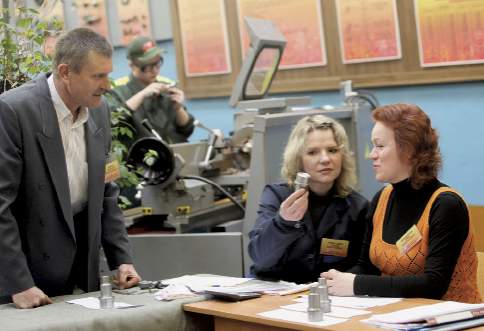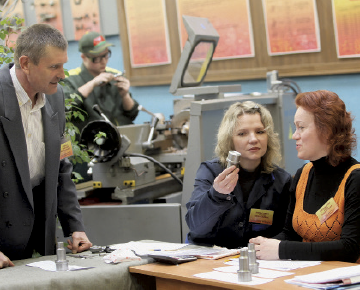It’s never too late to train for a new profession, even if you have only worked part time or unofficially for many years
Vocational training for those seeking employment is being taken in hand at the Republican Institute of Advanced Training — under the Ministry of Labour and Social Protection. Nearly 140 people across Belarus are currently enrolled in courses, in five groups, each dreaming of a new life without debt and a more certain future, without pity from friends or relatives.

Regional contest of professional mastery among college students organised in Gomel
Each group is organised with no more than 30 members, according to place of residence. Naturally, the idea is to make yourself more employable via gaining additional qualifications. Those taking part are taking responsibility for their own learning, motivating themselves to seek out pastures new. Denis, from Nesvizh, is taking the ‘Basics of Entrepreneurial Activity’ course, having been unemployed for 18 months.
He gave up his former job because he refused ‘to work hard for peanuts’ (Br7 million). Denis smiles, remembering the sum he received at his last place of work. The figure clearly amuses him, “I worked as a driver for a water shop, which paid me Br12 million a month initially. Then, they gradually began to lower my salary. I want to work for a set salary. This is the second year I’ve been living on savings.”
Those enrolled vary greatly in their experience: from 2-20 years. Some have only secondary education or specialised secondary education while others have higher education. All trades are represented: a hairdresser, a secretary, an economist-manager, a driver, a waiter, a teacher of English, a football coach, a ballet dancer, a confectioner, a cook, an engineer, a teacher-psychologist, a philologist, a house painter, and a salesperson, among others.
People from Minsk, Gantsevichi, Mozyr and Kopyl have signed up, all hoping to qualify for well-paid work or to start up their own business. Denis is planning a child-friendly pizzeria, without serving alcohol. In fact, he is a qualified child nutritionist and, having studied in Austria and worked in Norway, plans to incorporate certain Western trends. He imagines an open kitchen, so that children can watch the chefs creating the pizza dough.
“You can hold master classes on pizza preparation,” suggests Irina, Denis’ group mate. Natalia Dolbik, a teacher who heads her department of economy and management, adds, “Unexpected ideas often appear during our studies. Some people want to organise their own business, but aren’t sure what sort of business to try. It helps to share ideas.”
Irina, from Moscow, is married to a Belarusian and believed she’d only live in Minsk for two years. It’s been 12 years so far and she has hardly worked, due to two sets of maternity leave. This summer, her third child turned 3 years old, and Ira was registered as unemployed. She needs flexible working hours, so is rather choosy. She tells us, “I think that I’ll start organising children’s holidays, as I’ve some theatrical education and experience of working as an animator.” Before moving to Belarus, Irina graduated from Moscow’s Industrial College as an electrician, then worked as a secretary for various firms. Her parents are artists, while her brother is an interior decorator. Ira too wishes for creative fulfilment; it’s in her blood. That the course is short suits her perfectly.
Senior methodologist Valentina Brundukova describes the advantages of the training with enthusiasm, saying, “We’ve wide experience of working with adults and our teachers are ever improving their knowledge, to keep up with the latest trends. Our graduates don’t simply find work, they end up in management, marketing, human resource management, accounting and programming. We offer courses for secretaries and clerks, businessmen, managers and retailers.”
As to whether some of those who are unemployed are really just lazy, Valentina appears perplexed, saying that such people would rarely bother to try and improve themselves. She believes they are best suited to the fields and construction sites. She recalls, “An acquaintance of mine has a 40-year-old son who claims unemployment benefit. She spends her pension on him, and cooks him soups, as well as giving him money to buy beer and wine. He is onto a good thing. Such people would have to be escorted to work or they wouldn’t bother to show up.”
Natalia Dolbik is less categorical, noting, “There are different types of unemployed people, since some are extremely motivated. If we brought those with less enthusiasm here, they’d be infected with the same attitude. We’re ready to develop new programmes but I can hardly imagine how those who are used to doing nothing will cope with sitting at a school desk.”
Since 1991, workers at the Institute have accumulated wide experience in sharing expertise with the unemployed, teaching others what can be mastered. It’s amazing!











